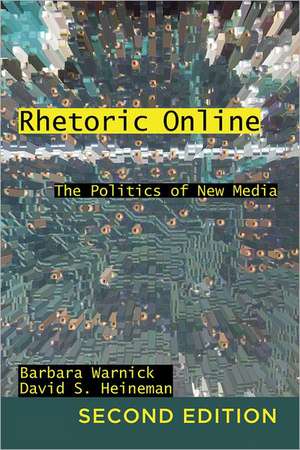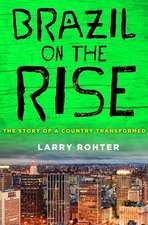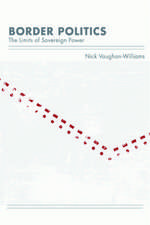Rhetoric Online: Frontiers in Political Communication, cartea 22
Autor Barbara Warnick, David S. Heinemanen Limba Engleză Paperback – 26 ian 2012
Din seria Frontiers in Political Communication
- 23%
 Preț: 441.66 lei
Preț: 441.66 lei - 23%
 Preț: 444.93 lei
Preț: 444.93 lei - 8%
 Preț: 557.73 lei
Preț: 557.73 lei -
 Preț: 537.79 lei
Preț: 537.79 lei -
 Preț: 372.08 lei
Preț: 372.08 lei -
 Preț: 299.88 lei
Preț: 299.88 lei -
 Preț: 442.59 lei
Preț: 442.59 lei -
 Preț: 329.32 lei
Preț: 329.32 lei - 20%
 Preț: 468.24 lei
Preț: 468.24 lei -
 Preț: 406.22 lei
Preț: 406.22 lei -
 Preț: 415.53 lei
Preț: 415.53 lei -
 Preț: 497.33 lei
Preț: 497.33 lei -
 Preț: 494.24 lei
Preț: 494.24 lei - 23%
 Preț: 504.96 lei
Preț: 504.96 lei -
 Preț: 342.46 lei
Preț: 342.46 lei -
 Preț: 275.70 lei
Preț: 275.70 lei - 27%
 Preț: 672.60 lei
Preț: 672.60 lei - 23%
 Preț: 656.18 lei
Preț: 656.18 lei - 27%
 Preț: 757.11 lei
Preț: 757.11 lei -
 Preț: 254.99 lei
Preț: 254.99 lei -
 Preț: 359.42 lei
Preț: 359.42 lei -
 Preț: 375.94 lei
Preț: 375.94 lei -
 Preț: 390.79 lei
Preț: 390.79 lei -
 Preț: 380.73 lei
Preț: 380.73 lei - 27%
 Preț: 955.13 lei
Preț: 955.13 lei -
 Preț: 408.88 lei
Preț: 408.88 lei -
 Preț: 388.45 lei
Preț: 388.45 lei - 27%
 Preț: 1068.64 lei
Preț: 1068.64 lei -
 Preț: 382.89 lei
Preț: 382.89 lei - 23%
 Preț: 972.63 lei
Preț: 972.63 lei
Preț: 338.50 lei
Nou
Puncte Express: 508
Preț estimativ în valută:
64.77€ • 67.63$ • 53.61£
64.77€ • 67.63$ • 53.61£
Carte tipărită la comandă
Livrare economică 05-19 aprilie
Preluare comenzi: 021 569.72.76
Specificații
ISBN-13: 9781433113291
ISBN-10: 1433113295
Pagini: 170
Dimensiuni: 147 x 221 x 10 mm
Greutate: 0.27 kg
Ediția:Nouă
Editura: Peter Lang Gmbh, Internationaler Verlag Der W
Seria Frontiers in Political Communication
ISBN-10: 1433113295
Pagini: 170
Dimensiuni: 147 x 221 x 10 mm
Greutate: 0.27 kg
Ediția:Nouă
Editura: Peter Lang Gmbh, Internationaler Verlag Der W
Seria Frontiers in Political Communication
Notă biografică
Barbara Warnick is Professor and Chair in the Department of Communication, University of Pittsburgh. Her research focuses on the rhetorical theory and criticism of persuasion in online public discourse.David S. Heineman is an Assistant Professor in the Department of Communication Studies at Bloomsburg University. His primary research interests are located at the intersection of rhetorical theory and criticism and new media technologies.
Recenzii
This new edition of 'Rhetoric Online' introduces students and scholars to key rhetorical theories and criticism of contemporary rhetorical practices occurring through Information and Communication Technologies (ICTs). Warnick and Heineman provide examples of rhetorical analysis of political communication and persuasion in ICTs, providing useful guidance to those interested in seeing rhetorical analysis of digital communication in practice. This book is essential reading for those interested in understanding and applying rhetorical analysis to digital and social media. (Jennifer Stromer-Galley, University at Albany, SUNY) One of the most challenging aspects of studying new media is keeping up to date when rapid changes in technology and platforms combine with the explosion of content made possible through the Internet. Warnick and Heineman's new edition of 'Rhetoric Online' helps scholars accomplish this goal by offering a rich variety of recent examples of online discourse as case studies for how rhetorical theory can best approach digital texts. New and expanded examples include the Tea Party, policy-making in the blogosphere, viral video, social media, and an extensive discussion of online campaigns in the 2010 U.S. midterm elections. Readers will find a similar breadth in theoretical insights, which combine to make 'Rhetoric Online' an important work for the study of digital discourse. (Danielle Wiese Leek, PhD, Associate Professor, School of Communications, Grand Valley State University)












